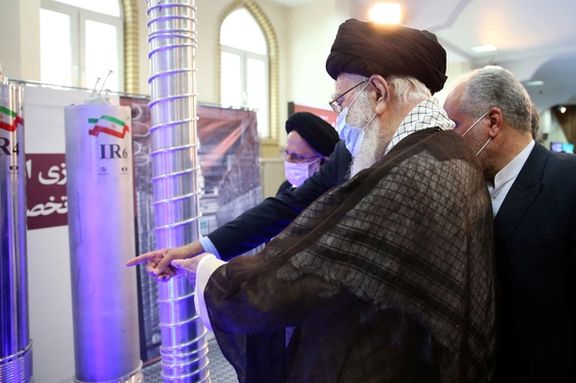Senior Iranian Diplomat says He Met With Europeans In UAE

Iran’s chief nuclear negotiator, Ali Bagheri-Kani tweeted Tuesday that he met with British, French and German diplomats in the United Arab Emirates recently.

Iran’s chief nuclear negotiator, Ali Bagheri-Kani tweeted Tuesday that he met with British, French and German diplomats in the United Arab Emirates recently.
In a short tweet in Persian, Bagheri-Kani who is also the deputy foreign minister, did not provide any details but there have been numerous media reports recently of contacts between Iran and the United States.
The three European countries are signatories of the 2015 JCPOA nuclear accord and have remained in the defunct agreement after the United States pulled out in 2018. During the Biden administration, however, their diplomatic approach has been more closely coordinated with Washington.
Western and Israeli reports, generally relying on anonymous diplomatic sources, say that Washington is exploring the idea of an interim nuclear deal with Tehran – possibly unwritten – that would aim to limit or cap the current dangerous levels of uranium enrichment in exchange for allowing other countries to release Iran’s blocked funds. Some have also suggested that beyond that the US might allow a limited amount of Iranian oil to be exported.

A second issue that has been the focus of contacts is US and Western demands that Tehran should free all prisoners it has arrested for no valid reason and essentially has jailed as hostages.
Neither Washington nor Tehran have denied meetings and contacts. In fact, the US State Department has repeatedly said it has its channels to relay messages to Tehran.
The Iranian foreign ministry Monday denied that an interim nuclear deal has been reached, although it did not deny that talks may be taking place.
Reuters quoted a US official also on Monday as saying that the United States and Iran are not discussing an interim nuclear deal, but Washington has told Tehran of steps that might trigger a crisis and those that may create a better climate between the long-time antagonists.
"There are no talks about an interim deal," said the US official, who spoke on condition of anonymity.
"We have made clear to them what escalatory steps they needed to avoid to prevent a crisis and what de-escalatory steps they could take to create a more positive context," he said, declining to detail these but noting Washington would like to see greater Iranian cooperation with the UN nuclear watchdog.
Reuters said that his comment went further than a US denial last week, which called a report the nations were nearing an interim deal "false and misleading" and said reports of such a deal were "false" but did not deny the possibility of talks about one.
The official did not deny media reports of recent US-Iranian contacts but rather said that suggestions they were about an interim nuclear deal were inaccurate.
Also, on Tuesday Israeli Prime Minister Benjamin Netanyahu reiterated his position that Iran is the biggest threat to his country’s security, and no agreement with Tehran will be binding on Israel.
“Over 90% of our security problems stem from Iran and its proxies, and our policy is aimed at increasing the circle of peace, to stop Iran and its proxies.”
Speaking at the Knesset Foreign Affairs and Defense Committee, Netanyahu said our position is clear: No agreement with Iran will be binding on Israel, which will continue to do everything to defend itself. Our opposition to a return to the original agreement, I think it is working, but there are still differences of outlook and we do not hide them, also about smaller agreements. We enunciate our policy clearly both openly and in closed rooms.